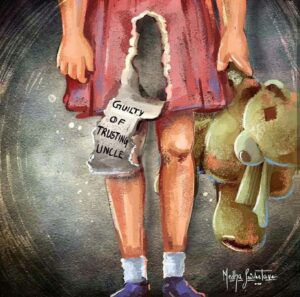“I was only thirteen.”
That’s how Amina starts her story—softly, eyes lowered, her voice steady despite the weight of what she carries.
She grew up in a warm but conservative home, surrounded by family and tradition. Her parents did everything they could to protect her, but like many girls, the danger didn’t come from outside. It came from someone they all trusted.
Her uncle.

At first, he was just generous. He’d bring sweets, schoolbooks, and little gifts. He praised her, made her feel seen. In a world where girls are often told to shrink, Amina was drawn to this attention. But what started as affection quickly turned into something sinister.
He began touching her in ways that made her stomach twist. At first, it was a brush of the hand that lingered too long. Then it escalated. When she tried to tell her mother, the words got stuck in her throat. “He’s family,” her mind screamed. “They won’t believe me.”
And she was right. When she finally gathered the courage to speak up, the response was silence and denial. “He wouldn’t do that. He loves you,” someone told her. The betrayal wasn’t just the abuse—it was being doubted, ignored, left to navigate the pain alone.
She started pulling away from the world. School felt pointless. Friends didn’t understand. Nights became unbearable, plagued by nightmares and panic. She began cutting herself, the pain a distraction from the numbness.
It wasn’t until a teacher noticed the shift in her—quiet where she used to be bubbly, lost behind tired eyes—that the light started to return. The teacher, kind and persistent, didn’t let the signs go unnoticed. She gently encouraged Amina to talk, then helped her connect with a counselor.
This was the beginning of her healing—not easy, not clean, but real. Therapy helped her name the things she felt: fear, shame, anger, and confusion. For the first time, she was told the truth: it was not her fault.
Some days were worse than others. Some nights she still woke up crying. But over time, the grip of trauma loosened. Her mother eventually came around, holding her tightly and whispering tearful apologies. That moment of being believed was everything.
Now 22, Amina is studying social work. She volunteers at a center for abuse survivors and speaks at schools when she can. She tells her story—not for pity, but for power. She wants other girls to know that survival is possible.
“Your silence does not protect you,” she says. “Speak, and keep speaking. You are not alone.”
Too often, culture teaches us to hide pain, especially when it comes to abuse. Girls are taught to stay quiet, to protect the family’s image, and to endure. But silence doesn’t protect—it isolates. It lets the cycle continue.
By telling these stories, we break the silence. We give power back to the survivor. We open a door for healing—not just for one person, but for many.
If you’re a survivor reading this, know this: your story matters. You matter. And healing is possible.

Amina’s story is deeply moving and highlights the resilience of the human spirit. It’s heartbreaking to see how she suffered in silence, especially at the hands of someone she trusted. Her journey toward healing is a testament to the importance of support and understanding from those around us. It’s inspiring that she now uses her experience to help others in similar situations. How can we create safer spaces for survivors to speak out without fear of judgment or disbelief?
Thank you so much for your heartfelt response. Amina’s strength truly is inspiring, and you’re absolutely right. Support and understanding are essential parts of the healing journey.Creating safer spaces starts with listening without judgment, believing survivors, and making sure they know they’re not alone. We can all play a role by challenging harmful stigmas, educating our communities, and fostering empathy in our conversations.Your reflection is a beautiful reminder of why this work matters.